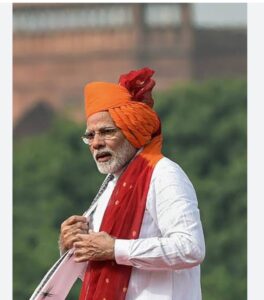NARENDRAMODI

INTRODUCTION
Narendra Modi is the current Prime Minister of India. He was born on September 17, 1950, in Vadnagar, a small town in the Indian state of Gujarat. Before entering politics, Modi worked as a tea seller and later joined the Rashtriya Swayamsevak Sangh, a Hindu nationalist group. He rose through the ranks of the Bharatiya Janata Party (BJP) and was elected as the Chief Minister of Gujarat in 2001. He served in that role until 2014 when he was elected as the Prime Minister of India.
As Prime Minister, Modi has implemented various economic reforms and initiatives to boost the country’s growth and development. He launched the Make in India initiative to encourage domestic manufacturing, the Digital India campaign to promote digital literacy and e-governance, and the Swachh Bharat Abhiyan to improve cleanliness and sanitation.

Modi’s annual income as Prime Minister of India is INR 20.82 lakh (approximately USD 27,600) according to his latest declaration of assets filed in 2019. However, he has no personal wealth or any property assets in his name. He claims to have a net worth of INR 2 crore (approximately USD 265,000), which includes savings accounts, fixed deposits, and National Savings Certificate (NSC) investments.
Narendra Modi was born into a family of grocers in Vadnagar, a small town in the Mehsana district of Gujarat. His father, Damodardas Modi, ran a small tea stall and his mother, Hiraben Modi, worked as a domestic help in nearby households. Modi grew up with five siblings and had a modest upbringing.
Modi’s family was part of the lower caste Ghanchi community, which traditionally worked as oil pressers and sellers of cooking oil. Growing up, Modi had a keen interest in spirituality and joined the Rashtriya Swayamsevak Sangh (RSS), a Hindu nationalist group, at a young age. His family was supportive of his political aspirations and encouraged him to pursue his goals.

Modi has been known to be a private person when it comes to his personal life and family. He was previously married in his youth, but the marriage ended in separation. He has no children and leads a simple lifestyle, often seen wearing traditional clothing and eating vegetarian meals.
CHILD HOOD
Narendra Modi was born on September 17, 1950, in Vadnagar, a small town in the Mehsana district of Gujarat. He was the third of six children born to his parents, Damodardas Modi and Hiraben Modi. His father was a grocer and ran a small tea stall, while his mother worked as a domestic help to support the family.
Modi showed an early interest in spirituality and joined the Rashtriya Swayamsevak Sangh (RSS), a Hindu nationalist group, at a young age. He would often spend hours reading books as a child, and was said to be a good debater even in his school days.
Modi attended a local school in Vadnagar before completing his higher studies in Ahmedabad. He later enrolled in Gujarat University to study political science but dropped out soon after to pursue activism full time.
Modi’s childhood was marked by financial struggles, but he was determined to overcome his circumstances and make a difference in the world. He often recalls his early struggles and how they shaped his values and approach to life.
POSITYVITY
Narendra Modi is known for his positivity and optimistic attitude towards life. He is often seen as a charismatic leader who inspires others with his positive message and vision for India’s future. Here are some ways in which Narendra Modi has demonstrated positivity:
- Positive vision for India: Modi envisions a prosperous and developed India, and he works tirelessly to achieve this vision. He often talks about the potential of India and its people, and encourages others to work towards a better future.
- Focus on solutions: Modi is known for his problem-solving abilities and his focus on finding solutions to challenges. He encourages innovation and creativity to find solutions to complex problems.
- Positive attitude: Modi has a positive attitude towards life, even in the face of challenges and criticism. He encourages others to stay positive and remain hopeful, no matter the circumstances.
- Empowering people: Modi believes in empowering people and giving them the tools they need to improve their lives. He has implemented various programs to provide education, employment, and health services to the people of India.
- Promoting positivity in society: Modi encourages people to spread positivity and kindness in their communities. He has launched campaigns such as “Swachh Bharat Abhiyan” (Clean India Mission) and “Fit India Movement” to promote a healthy and clean society.
Overall, Narendra Modi’s positivity and optimistic approach to life have helped him become a popular and respected leader in India, and inspire many others to pursue their goals with positivity and determination.

- “Sabka Saath, Sabka Vikas” (Together with all, Development for all)
- “Achhe din aane wale hai” (Good days are about to come)
- “Minimum government, maximum governance”
- “Digital India”
- “Swachh Bharat Abhiyaan” (Clean India Mission)
- “Make in India”
- “Skill India”
- “New India”
- “Jan Dhan Yojana” (People’s Wealth Scheme)
- “Saaf Niyat, Sahi Vikas” (Clean Intentions, Right Development)
